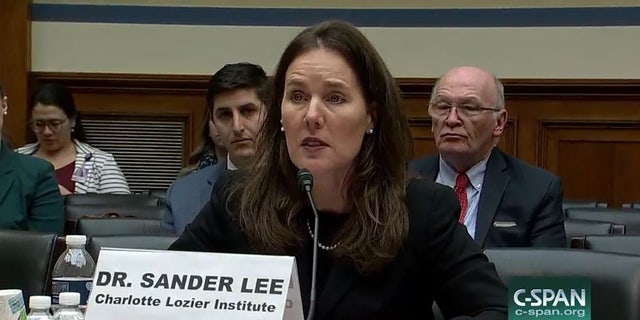Mississippi governor says scientific advances have bolstered chance abortion ban will succeed at SCOTUS

Fox News Flash top headlines for November 30
Fox News Flash top headlines are here. Check out what’s clicking on Foxnews.com.
Mississippi Gov. Tate Reeves believes his state’s abortion ban has a solid chance of succeeding at the Supreme Court, arguing that advances in scientific knowledge have bolstered the case against abortion since Roe v. Wade was decided.
“I believe that the science has changed,” he told Fox News during an exclusive interview on Tuesday. “Here’s what we know about a child at 15 weeks. We know that that child has a heartbeat. We know that that child pumps multiple quarts of blood every single day. We know that that baby is developing its lungs. We know that that baby can squeeze its hands, its fingers. And we know that that baby can feel pain.”
His comments came on the eve of the Supreme Court hearing oral arguments in Dobbs v. Jackson Women’s Health, which involves a challenge to his state’s 15-week ban on abortions.
“I believe that the science has changed.”
Mississippi Gov. Tate Reeves speaks at the Governor’s Mansion June 30, 2020, in Jackson, Mississippi. (Getty Images)
Reeves’ comments reflected longstanding arguments on the right; namely that scientific advances have revealed critical insights about life in the womb.
“Nearly 50 years of scientific advancement have literally unveiled the humanity of the unborn child,” said Dr. Tara Sander Lee of the anti-abortion Charlotte Lozier Institute.
“Nearly 50 years of scientific advancement have literally unveiled the humanity of the unborn child.”
Dr. Tara Sander Lee (CSPAN)
She told Fox News on Tuesday that before Roe “the unborn could barely be seen inside the womb via grainy black and white ultrasound images while now-debunked science claimed the unborn couldn’t feel pain. After Roe, advancements in fetal ultrasound developed rapidly, paving the way to see the unborn with clarity, allowing the diagnosis of fetal malformations with more accuracy and surgical repair of some conditions inside the womb.”
Mississippi’s case rests on the idea that existing evidence has given states enough justification to protect fetal life 15 weeks into a woman’s pregnancy. Prior court decisions have protected abortion access pre-viability, or before fetus can survive on its own. That time limit is constantly receding and recently a baby in Alabama was born at 19 weeks – just prior to the 20-week cutoff that was proposed and rejected by the Senate in 2018.
Pro-choice and anti-abortion demonstrators rally outside the U.S. Supreme Court on Nov. 1, 2021 in Washington, D.C.
(Getty Images)
Reeves’ state is asking the Court to effectively disregard previous rulings and allow states the leeway of setting specific limits on abortion. Attorneys for Jackson Women’s Health Organization, meanwhile, have argued that there’s no reason for the Court to do away with decades of precedent.
Fetal pain debated
The debate over fetal pain is especially contentious as science is still developing on that topic.
Critics like Dr. Jen Gunter have argued that fetuses can’t feel pain until around 28-29 weeks.
“The thalamocortical fibers, the connections in the brain from the thalamus to the cortex, start [emphasis hers] to develop around 23 weeks gestational age,” Gunter told Fox News via email last year.
The American College of Obstetricians and Gynecologists has argued that “perception of pain requires more than just the mechanical transmission and reception of signals.”
But Lee says recent research has revealed more about pain.
“Modern pain research replaced the old myths with scientific facts that the unborn do feel pain, possibly as early as 12 weeks,” Lee said. “Analgesics are now routinely given for in utero fetal surgery. Roe needs to be thrown out. It’s outdated, antiquated, and needs to be replaced with a modern law that reflects the science of today, not 50 years ago.”
“Roe needs to be thrown out. It’s outdated, antiquated, and needs to be replaced with a modern law that reflects the science of today, not 50 years ago.”
She pointed to writings from Dr. Stuart Derbyshire, who previously dismissed “fetal pain” as a “misnomer.” In 2020, he co-authored a paper suggesting that the prevailing consensus – pain at 24 weeks – could be wrong.
“[T]he evidence, and a balanced reading of that evidence, points towards an immediate and unreflective pain experience mediated by the developing function of the nervous system from as early as 12 weeks,” the paper read.
Battle intensifies?
Should Mississippi succeed, the political battle over abortion will likely intensify as states wrestle over specific legislation banning the procedure.
A police officer maintains a watch outside the Supreme Court building, Nov. 3, 2021, in Washington, D.C.
(Getty Images)
House Democrats have already preempted a more conservative decision by passing the Women’s Health Protection Act, which aims to codify Roe in federal law.
Regardless, Reeves told Fox News: “I’m not every going to stop trying to protect innocent lives. I believe that people like me have to stand up for the rights of the unborn because they can’t stand up for themselves.”
He added that “every single opportunity we get to reduce and limit the number of abortions is a victory for the pro-life movement.”
Source: Read Full Article





